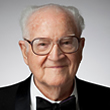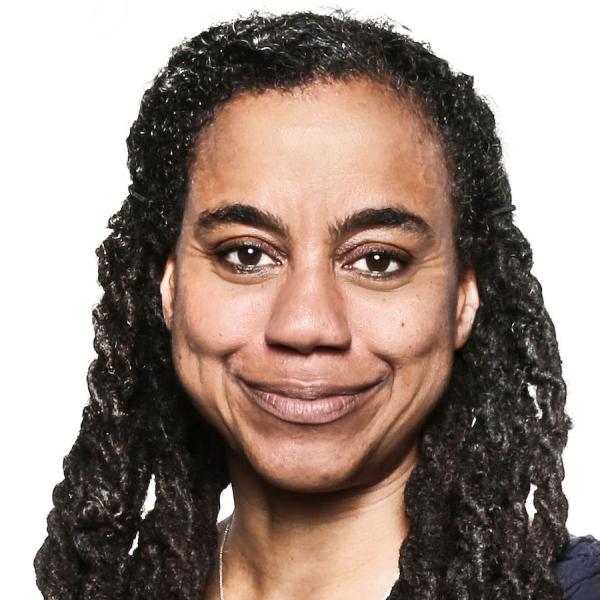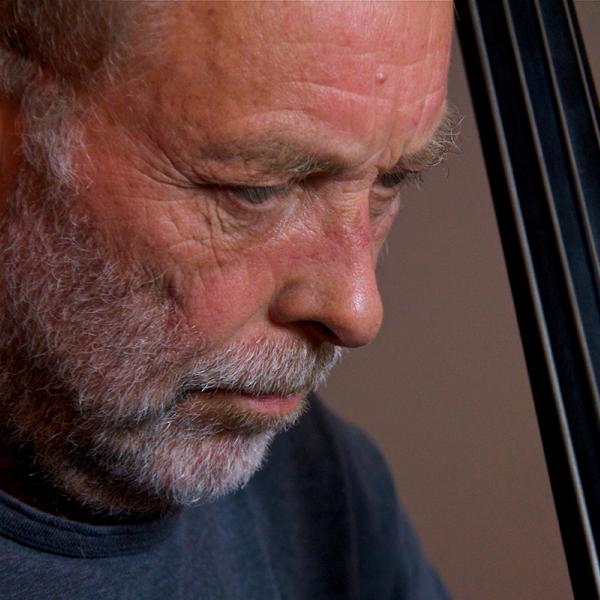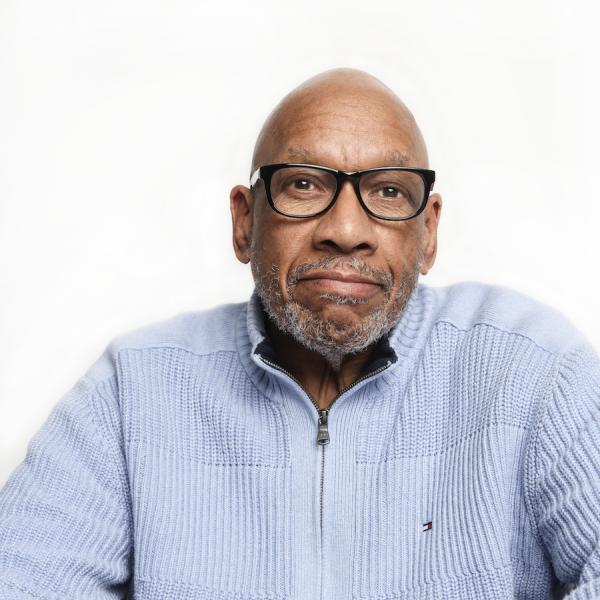Robert Ward

(Music up)
Jo Reed: That was an excerpt from The Crucible, based on the play by Arthur Miller. The libretto was written by Bernard Stambler and the music was composed by 2011 NEA Opera Honoree, Robert Ward, who died this April.
Welcome to Art Works, the program that goes behind the scenes with some of the nation's great artists to explore how art works. I'm your host, Josephine Reed.
The music world suffered a loss this past April when Robert Ward passed away at the age of 95. Ward was a composer, an army band leader, a publisher, and an educator. Although he composed seven symphonies, three concerti, and numerous shorter pieces for orchestra, small ensembles, and voice, he was best known for his operas, and the opera he is best known for is his 1962 Pulitzer-Prize winning work, The Crucible.
Much of Ward's music has a distinctly American flavor, filled with strains of jazz and folk songs. His operas and many of his shorter vocal works reflect his concerns about social and political issues. I was fortunate enough to speak to Robert Ward close to the end of life. And what a life he led! Ward was something of a musical savant: he began singing in grade school, and composing in high school. He studied composition at the Eastman School of Music in Rochester where he said he spent the four greatest years of his life. But New York City was calling and in 1939 he found himself packing his bags for Julliard.
Robert Ward: By that time, I was thinking that New York was the center of everything, so I found out that Juilliard had no tuition there. It was all fellowships. And I knew that I could have about $80 a month to live on, which I could do, so that was the next two and a half years until I was drafted into the army.
Jo Reed: One of your teachers at Tanglewood was the great Aaron Copeland. Tell me what it was like studying with him?
Robert Ward: Well, Aaron didn't talk a lot. He listened very carefully to whatever you were working on. Then he'd shake his head and would say, "Bob," he said, "do you compose sitting at the piano?" And I said, "Yes, I do." And he thought a moment and he said, "You know, I think you'd do a lot better to get away from the piano because you've got a good ear, a good sense of the orchestra and you ought to try it." So, at Tanglewood, the boy’s school where we stayed looked out onto the mountains, so I'd go out there on a porch every morning and sit looking at these mountains and sketching. It was the greatest lesson I ever had in my life and I obeyed it ever since.
Jo Reed: So it changed the way you write music?
Robert Ward: Well, it didn't change the music but the difference was that when you're just taking it down with your pencil, you could get 50 bars in a row if it was going. So you could write much faster and that's always better when it's spontaneous like that.
Jo Reed: But then, 1941, and World War II begins.
Robert Ward: That's right.
Jo Reed: You entered the army. What happened there?
Robert Ward: Well, I just went to Fort Riley, Kansas, for my basic training and I was about three or four weeks in when I had a letter from the commandant's office to meet in his office sometime in the next few days. I wondered what did I do to have to go to-- well, I got there and it turned out that there were four composers there and three writers. And he said, "Well, fellas," he said, "you're probably wondering why you're here." And we said, "Yeah, what did we do?" And he said, "Well, I'll tell you. We were wondering if you could write an all-soldier show for the Fort Riley." Well, the silliest question we ever heard. So that was decided on, the show was called The Life Of Riley, and for the next six or eight months, we wrote the show, we took it on the road and toured it and you didn't expect that in the army, but it was wonderful. But then, when that was over, there was a question of what did I do from that point on. So there's the army music school which was to teach band members how to conduct so that they could become band leaders. Well, actually, I had been teaching conducting at Juilliard so I was only there for a month and then I went out to California where I became the band leader of the Seventh Division, which was in training.
Jo Reed: That was your exposure to jazz, too, wasn't it?
Robert Ward: It was. More than that. When I got there, the men had just come in off a maneuver on the desert, so we knew that we were probably going to be headed for a combat. We were doing the training for that. Meanwhile, we were playing a lot of concerts for other units in the camp. So, finally, we noticed we were getting parkas and all these winter clothes. Well, that didn't sound like the desert, but instead it was Attu up in the Aleutian Islands. So that was the first of the islands which we took from the Japanese, who were occupying it at that time. From that point, we went on and we became the first troops into the Philippines and, from there, we went to Okinawa, where we knew that we were there to be the first troops into Hiroshima at that time. But the atomic bombs were dropped at that point. Japan surrendered and so we never did go into Japan at that time. Instead, we became the first occupation troops in South Korea. And that was my last period in the army before I got out.
Jo Reed: Well, talk about jazz and the army, because I think you had said neither Juilliard nor Eastman at that time really taught or had any jazz classes. And it was by playing swing in the army that was your jazz education.
Robert Ward: Well, that's right. It wasn't my education because I always loved jazz but, at Eastman and Juilliard, jazz was still kind of low brow. But, when I got to my band with the seventh infantry, I had a terrific swing band and then later, when we became the division band, I not only had that but a Guy Lombardo band and a Goodman sextet, for which I could write and conduct and so forth, which I did. That was my real beginnings so far as jazz was concerned in knowing how to write it and so forth.
Jo Reed: One of your major pieces was largely written in Okinawa. And you called it Jubilation: An Overture.
Robert Ward: That's right. That overture I wrote, we were the guard for the division headquarters at night. During the day, we would sometimes have some work but we had a lot of time. So I wrote several scores there, one was Jubilation: An Overture. People have always asked me how I wrote this very happy piece when I was in the army waiting to go to Okinawa. But, by that time, it was clear that the Japanese weren't going to be in it much longer and, of course, we then were there when they surrendered. So this piece is jazzy- it's for a big symphony orchestra- but it's very jazzy and very optimistic. That was the reason why, because we knew it was going to be over pretty soon and we'd be out of the army.
Jo Reed: After you left the army you returned to Juilliard, where you first were a graduate student and then began to teach.
Robert Ward: Well, I just had my last half year to finish and so I did that. And then, well, already I had been teaching a class at Juilliard and a couple at Columbia University so I went right on to the faculty at Juilliard and was there for the next ten years.
Jo Reed: Well, Bob, tell me, how did you move into composing for opera?
Robert Ward: Well, even when I was in my last year at Eastman, I began to think about writing for opera because I had seen a lot of it and I loved it. But I didn't have a librettist and so I am happy to mention that the dean at Juilliard and just that moment his phone rang and he said, "Look, I've got to take this call but just wait here and you may meet your next librettist." Sure enough, it was Bernard Stambler, a member of the academic faculty. He knew more opera than I ever knew. But Bernard Stambler, who was teaching English and History, became my librettist and we wrote, finally, four operas together.
Jo Reed: You were writing opera at a really pivotal time in American opera. It was really just the beginning, wasn't it?
Robert Ward: That's right. Because there was very little before the war, the Metropolitan and a few like that, but it was not widespread. But, after the war, the Ford Foundation made a two-year grant to the New York City Opera to do two seasons of American Opera. And I had had a grant that gave me a year off in which Bernie and I wrote our first opera, which was based on an Andreev, the Russian playwright's, play called He Who Gets Slapped. It was a wonderful play for two acts and then it really didn't suit our needs. But we found that it was not under copyright in the United States so we did our opera on that and changed the last two acts a good deal, which was very successful, and it was then performed in one of those first seasons that the Ford Foundation gave. Well, it was very successful there and, before we finished the run, Julius Rudel, who was the head, said to us, "Look, do you have another opera on the mind?" We said, "Well, we have but we haven't decided what it should be." And he said, "Well, when you decide, come back. We want to commission it." That's when I discovered it through one of the other players in our first opera, and I felt right away that it was absolutely what we wanted to do.
Jo Reed: You're talking about The Crucible now?
Robert Ward: Yes.
Jo Reed: The Crucible, Arthur Miller's play.
Robert Ward: That's right, and we had seen what was the second performance and I was more moved than I've ever been at a play at the end of that. The next day, I called Bernie or even that night, I called him and I said, "Bernie, have you got the volume of plays?" and he said, "Yes," and I said, "Read it and call me back. I think this is it." That's the way it worked out.
Arthur was very interested in the opera being made of it, and brother said, "Get him three tickets," this being Miller and his producer and guess who? Marilyn Monroe. So, when this came out to the theater, they even sold some more tickets for sure because they thought Marilyn would be there. Well, she didn't come. But Arthur and his producer came. We went out after the show and had a drink. And I then learned that, even at the beginning, he had thought it might make a better opera than a play. So things worked out very smoothly until we had to go through his agent and that's another story. When we started, Julius Rudel--
Jo Reed: And Julius Rudel was the head of the city opera?
Robert Ward: That’s right. Julius Rudel, well he loved the idea, so he scheduled it to be produced in about nine months. I thought, that's tough. Mozart and Verde wrote their operas in about three weeks, but Strauss and Puccini wrote theirs in about four years. But we wanted to do it so badly that we said okay.
Jo Reed: I’m curious about the process of how you go about looking at words on a page, and how that transforms into music in your mind.
Robert Ward: Well the first thing that you do is you turn the play into a libretto, and there are about a third as many syllables in a libretto that will turn into an opera the same length as the play with, you know, 100 percent of the words. So that's the first thing that has to be done. Bernard Stambler and I worked very closely on that and that meant cutting some scenes and writing new things for certain ones.
One very famous scene in the opera was the beginning of the third act when you have a great scene which starts out as a love scene between Abigail and the hero. Arthur had written one at the behest of the first director but he never felt it was a good scene. But we felt it was a very important time for that scene. So we wrote it and we read the text that Bernie had written for it to Arthur and he said, "Boy, that's good. That's the way it should be." And it's been one of the most popular scenes because it really was the end of their love. So, that was the way it went.
Jo Reed: It strikes me as interesting because what music does is it heightens the emotion and it would seem to me that would be a line you need to walk because you want to heighten the emotion through the music without going over the top.
Robert Ward: Well, you could heighten them in a shorter time, in a way, and with a greater intensity. So that's the way it works. And the opera, in fact, is a little shorter than the play, but it has great intensity and it has the rise and fall of the intensity in each scene. You are aware of it but you only have a third as many words to deal with. That's the great help.
Jo Reed: You also got a Pulitzer Prize for it.
Robert Ward: Yes. It won the Pulitzer Prize that year and the Critic Circle Award. That got it started. Even before that year ended, there were already two or three more productions around the country.
Jo Reed: I’d like to look at your career as an educator. You had always been teaching, but then in 1967 you became chancellor at the North Carolina School of the Arts.
Robert Ward: Yeah. I was asked to come and be the chancellor at the North Carolina School of the Arts. Well, that is not quite like any other school has ever been and was an exciting new thing, joining all of the arts in that one school. That's all that we did. William Schuman, who was the president at Juilliard and had some of these same ideas, we were able to carry them even further. And with state support, it was an incredibly exciting school. That was part of the reason that I only remained as chancellor for seven years, because it was getting to take so much of my time that it was cutting in on my composing. I had, right at the start, determined that I'd never let that happen. So I stayed on at the school teaching for another five years on a very light schedule. But then, for various reasons, my wife and I decided we wanted to move on. I was pretty sure I could find things I would want to do in New York. But, in any case, we sat down with Dr. and Mrs. James Semans. Jim was the board president at the School of the Arts and his wife was Mary Duke Biddle. Well, when we told them, Mary Semans said, "Well, we can't have you leaving North Carolina" and a couple weeks later, there was a chair professorship opened up and we moved to Duke. That's where I finished my teaching career.
Jo Reed: Did you enjoy teaching as much as composing?
Robert Ward: You know, all of these things that I did in my life, I enjoyed because they were all really helping the whole situation that existed in getting more opera in the country. But I felt the best talent I had was to compose and I wasn't going to give that up.
Jo Reed: Throughout your career, you have been a consistent voice about the importance of arts education and how vital it is to the health of art itself.
Robert Ward: That's right because the schools, particularly the great universities, not only teach the people who make the arts but they make the audience give them their beginnings and stimulate their interest in the arts. That's the other great part of it.
Jo Reed: Over the course of your career, you really have seen contemporary opera, contemporary American opera particularly, blossom. Did you ever anticipate it would be as prolific as it is?
Robert Ward: Well, as soon as the Ford Foundation and other organizations got interested--you know, opera's very expensive and so, once those people came in, then the composers were stimulated to write because there were commissions. For instance, after The Crucible, all my operas have been on commissions, so that it became an element in your life as well, and your income. So it was a combination of things that developed. But it was also time in another way. You know, there were many organizations with respect to war that began even before World War II ended by some of the greatest men who had been in a very high position in World War II. But it was because they realized, in the first place, that there were far more civilians killed in World War II than soldiers. They also realized that hundreds of cities were wiped out and the costs were monumental. And so they began, particularly the Western Europe countries, England, France, and Italy, became very interested in getting the world to live at peace instead of solving their problems with wars. That was a great help, too. You'll find that many of the operas and movies and plays that were written after that began to have that kind of subject matter.
Jo Reed: Life affirming.
Robert Ward: Yes.
Jo Reed: I want to talk about your last composition, which you wrote in 2008 or premiered in 2008, to be precise.
Robert Ward: Yes.
Jo Reed: In Praise of Science. Tell us about that.
Robert Ward: Well, it's a changed attitude toward all the mystical things in religions down to what we are learning about the past from our sciences these days.
I wrote that because, from the time, really, after World War II ended, see, I was right there and I would have been in the first battle with the atomic weapons. And later, when I was back in Japan, I visited the great museum commemorating that event. Well, the bombs that fell, those two, were amateurish compared to the huge developments afterward, not only in the United States, but about ten other nations. If we could understand how practically the world, our world could be simply wiped out by another war using those. So that was on our minds and in this latter part of my life, I've been very preoccupied thinking about those things and, indeed, writing, maybe they'll never get published, but a sort of possible utopia for 200 years hence if we learned the lessons that we should learn out of what World War I and II taught us.
Jo Reed: And let me ask you finally, Bob, how did you find out that you were given the Opera Honors?
Robert Ward: By the letter which I received. This was a complete surprise. That had been the biggest award I'd ever reached for anything I'd done. So it was a wonderful surprise. I have had notes or letters from many of my friends I haven't seen or worked with for 25, 30 years but it's brought that all together again. That's a nice after effect, I must say.
Jo Reed: That's lovely. Many congratulations again, Bob.
Robert Ward: Well, thank you.
Jo Reed: Thank you so much, Bob.
That was 2011 NEA Opera honoree, Robert Ward. Bob passed away in April 2013. He was 95 years old.
You’ve been listening to Art Works, produced at the National Endowment for the Arts. Adam Kampe is the musical supervisor.
Excerpts from The Crucible, performed by the New York City Opera, conducted by Emerson Buckley, used courtesy of Albany Records. The Crucible is based on the play by Arthur Miller with a libretto by Bernard Stambler and music by Robert Ward.
Excerpt from "Jubilation, an Overture," composed by Robert Ward, performed by the North Carolina Symphony Orchestra, conducted by Gerhardt Zimmerman, used courtesy of Albany Records.
Excerpt from "In Praise of Science," composed by Robert Ward, the text is drawn from the poem “Science,” by Anne Lynch Botta. Performed by soprano Laura Enslin and the Syracuse University Brass Ensemble, conducted by James T. Spencer, used courtesy of the Syracuse Brass Ensemble.
The Art Works podcast is posted every Thursday at arts.gov. And now you can subscribe to Art Works at iTunes U—just click on the iTunes link on our podcast page.
Next week, Stephan Jost, director of the Honolulu Museum of Art.
To find out how art works in communities across the country, keep checking theArt Works blog, or follow us @NEAARTS on Twitter. For the National Endowment for the Arts, I'm Josephine Reed. Thanks for listening.
Toward the end of his life, Robert Ward discussed his remarkable career in music.




